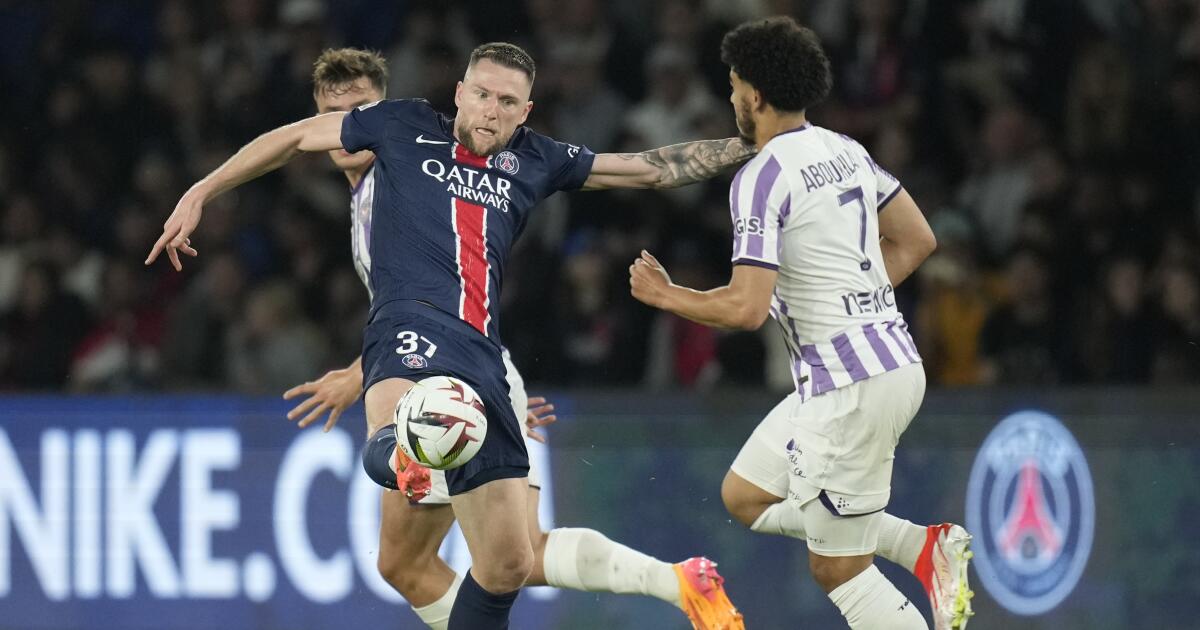Last week, for the first time in nearly a decade, Paris Saint-Germain opened its season without Neymar, Lionel Messi or Kylian Mbappe. Two years ago, it had all three — and a payroll of $803 million, the highest in club soccer history.
But the change in strategy doesn’t signal a change in ambition or a reluctance on the part of the team’s Qatari president, Nasser Al-Khelaifi, to keep spending. What it does mean, however, is that Al-Khelaifi plans to chase that ambition by spending in a different way.
“I was asked who will be PSG’s star [this] year,” Al-Khelaifi said at last spring’s Globe Soccer Awards. “It’s the team, the collective team. That’s our ambition, that’s our strategy.”
The blueprint for that strategy actually started taking shape in the summer of 2023 when the club opened a $385-million training base in the western suburbs of Paris that included training, education and accommodation facilities for PSG’s 140 academy players.
At about the same time, Neymar left for the Saudi Pro League and Messi signed with Inter Miami of MLS, leaving PSG with the youngest team in the quarterfinals of last season’s Champions League, averaging less than 25 years of age.
When the 25-year-old Mbappe left this summer, signing a five-year contract with Real Madrid worth a reported $250 million, the roster average got 18 months younger and the team tightened its focus on integrating young talent into the first team.
It’s not a bad plan considering PSG sits in the center of some of the most fertile soil in the world for developing soccer players. Thirty players who participated in the 2022 Qatar World Cup, including Mbappe, were born in Paris or the surrounding Ile de France, compared to 12 from Sao Paulo and eight from London, according to the BBC. And with more than 1,000 players scattered around the globe, France is the world’s second-leading producer of young soccer talent, trailing only Brazil.
“We continue to build a fantastic young team at Paris Saint-Germain, based on teamwork, talent and collective spirit — which is the foundation of our club’s great future,” Al-Khelaifi said earlier this month.
It’s not as if the team is completely lacking in established world-class talent. Marquinhos, PSG’s 30-year-old captain, is a two-time World Cup player entering his 11th season with the club. Defenders Lucas Hernandez and Presnel Kimpembe and winger Ousmane Dembélé are all World Cup champions while goalkeeper Gianluigi Donnarumma is a former European champion.
But the roster also includes 10 teenagers.
“Do we want to win the Champions League? Yes,” said Al-Khelaifi, who once pursued the Champions Leagues with the same ferocity with which King Arthur sought the Holy Grail. “But is it the objective? No.
“It’s to do the best, to continue building what we’re doing today, building the team, the style of the game that we love, the offensive style.”
PSG should have no trouble winning its sixth Ligue 1 title in seven seasons judging from how it started this one, with a 4-1 thrashing of Le Havre in last week’s opener. But then domestic supremacy has been more an expectation than an achievement for the club since 2011, when Al-Khelaifi bought a team that had won just two league titles, none this century.
Since then it has won 10 in 13 seasons. But only twice in that span has it reached the semifinals of a European tournament, losing in its only trip to the Champions League final in the COVID-interrupted 2019-20 tournament.
In that time, an unprecedented number of soccer icons have passed through the dressing room at Parc des Princes stadium, from David Beckham, Zlatan Ibrahimovic and Angel di Maria to Neymar, Messi and Mbappe, draining the bank account of Qatar Sports Investments, the Qatari government-backed investment fund that holds 87.5% of the club’s shares.
Despite all that money failing to buy the Qatari investors what they wanted most, the owners have hardly become spendthrifts, shelling out $187 million in the summer transfer window in addition to investing in the academy and a new training ground, one with 16 hybrid and synthetic fields.
But they’ve also decided to try to reap the rich harvest of talent that is growing in and around those fields. Whether that pays off, only time will tell. What’s certain, however, is that investing in a galaxy of stars didn’t buy the team what it wanted either.
⚽ You have read the latest installment of On Soccer with Kevin Baxter. The weekly column takes you behind the scenes and shines a spotlight on unique stories. Listen to Baxter on this week’s episode of the “Corner of the Galaxy” podcast.

